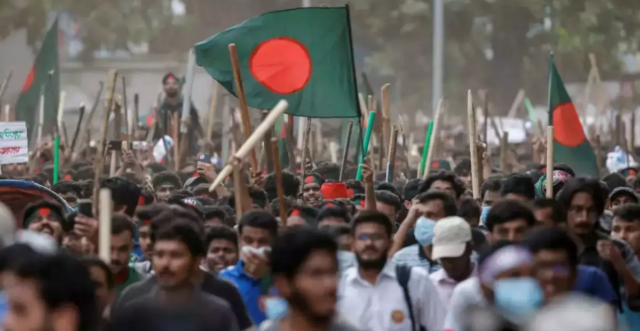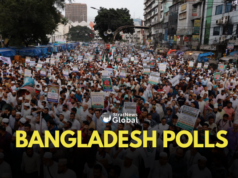Less than a day after Prime Minister Modi was briefed on the situation Bangladesh by Dr S Jaishankar, the Ministry of External Affairs (MEA) again took up cudgels on behalf of that country’s minorities.
“Our position is clear, the interim government (in Bangladesh) must live up to its responsibility of protecting all minorities,” was the word during Friday’s briefing in Delhi.
“India has consistently and strongly raised with the Bangladesh Government, the threats and targeted attacks on Hindus and other minorities. We are concerned at the surge of extremist rhetoric, increasing incidence of violence and provocation. These incidents cannot be dismissed as media exaggeration.”
Regarding the arrest of ISKCON monk Chinmay Krishna Das on the charge of sedition (he is accused of hoisting a saffron flag over the Bangladesh flag), and the report about the freezing of his bank account, the spokesman said:
“We see ISKCON globally as a well regarded organisation with a record of social service. As far as the arrest of Chinmoy Das is concerned … it is our expectation that cases against individuals … these processes are underway .. we hope that these processes will be dealt in a fair, just and transparent manner ensuring full respect of their legal rights of these individuals and all those concerned.”
Even as concerns continue to grow in India about Bangladesh, there are reports that the student leaders who spearheaded the movement to oust Sheikh Hasina, plan to form a new political party in the next few months.
A report in the Dhaka Tribune said the student leaders “plan to form a new political party and participate in the next parliament election. Preparations are underway to announce the new party in January 2025 with Adviser Mahfuj Alam likely to head it after resigning from his current role.”
The report said efforts are on to include “notable young leaders from various political parties including the BNP, in the student-led initiative.”
It seems the move to form a new political party began in September itself in the wake of the July-August mass uprising against Sheikh Hasina. The students fanned out across districts setting up committees in 15 of them.
Also involved in this is the Jatiya Nagorik Committee (JNC), a political platform set up shortly after Hasina’s ouster, to build consensus on remaking Bangladesh as an inclusive democracy. The new party is ready to welcome people and leaders from all other parties with the JNC acting as a pressure group.
The Dhaka Tribune report key student leader Abdul Kader as saying “This banner (JNC) will never directly evolve into a political party. As long as this is needed, it will remain a united, non-political platform working with everyone during a national crisis.”
Thirty eight years in journalism, widely travelled, history buff with a preference for Old Monk Rum. Current interest/focus spans China, Technology and Trade. Recent reads: Steven Colls Directorate S and Alexander Frater's Chasing the Monsoon. Netflix/Prime video junkie. Loves animal videos on Facebook. Reluctant tweeter.





